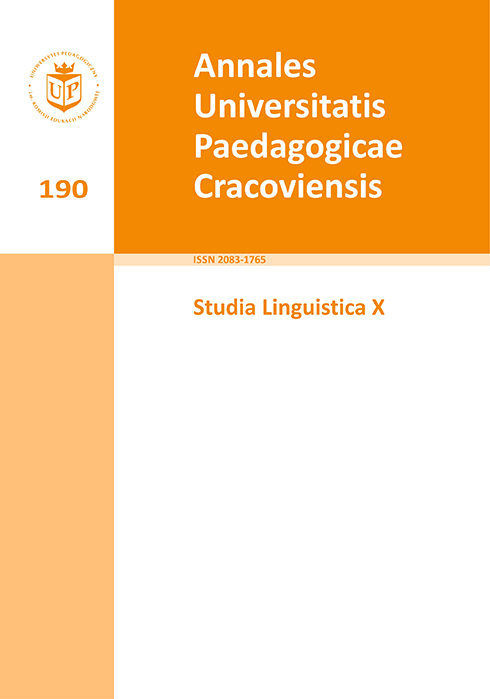Formy adresatywne w ustnej komunikacji religijnej – aspekt empiryczno-porównawczy (na materiale współczesnego języka polskiego i ukraińskiego)
Main Article Content
Abstrakt
The author talks about chosen issues connected with usage of addressing forms in oral religious communication concerning three plains of using addressing forms in communicational situational contacts with the representatives of Catholic and Orthodox Churches: usage of complete ways of expressing addressing in Polish language; usage of names; usage of titles. Those three areas of functioning the addressing forms in oral communication are examined in the framework of different directions of religious communication: clerics- -clerics, clerics-parishioners, parishioners-clerics and possibly parishioners-parishio- ners in communicational situations concerning the life of a parish. Those ways show the types of communicational situations where potentially can be found the sender and the recipient.
Downloads
Article Details

Utwór dostępny jest na licencji Creative Commons Uznanie autorstwa – Użycie niekomercyjne – Bez utworów zależnych 4.0 Międzynarodowe.
Autor, zgłaszając tekst do redakcji czasopisma „Annales Universitatis Paedagogicae Cracoviensis. Studia Linguistica”, zaświadcza, iż jest on rezultatem wyłącznie jego własnej twórczości, że treść artykułu nie była dotychczas publikowana oraz że utwór nie narusza w żadnym stopniu praw autorskich ani praw pokrewnych innych osób, jak również innych praw osób trzecich, a także, że niczyje prawa do utworu (lub jego jakiejkolwiek części) nie zostały pominięte. Po podpisaniu umowy prawa majątkowe do opublikowanych materiałów zostają przeniesione na Uniwersytet Komisji Edukacji Narodowej w Krakowie.
Rocznik „Annales Universitatis Paedagogicae Cracoviensis. Studia Linguistica” to czasopismo o otwartym dostępie, a cała jego zawartość jest udostępniana bezpłatnie dla użytkowników i instytucji na zasadach licencji Creative Commons CC-BY-NC-ND 4.0 (uznanie autorstwa, użycie niekomercyjne, bez utworów zależnych). Na podstawie tej licencji autorzy zgadzają się, że ich prace mogą być zgodnie z prawem ponownie wykorzystywane do jakichkolwiek celów, za wyjątkiem celów komercyjnych, bez konieczności uzyskania uprzedniej zgody ze strony autora lub wydawcy. Każdy może prace te czytać, pobierać, kopiować, drukować, rozpowszechniać oraz przetwarzać, pod warunkiem poprawnego oznaczenia autorstwa oraz oryginalnego miejsca publikacji. Publikowanych tekstów nie można wykorzystywać do tworzenia utworów zależnych (np. do tłumaczenia ich i publikowania w innym języku bez zgody wydawcy). Jest to zgodne z definicją otwartego dostępu BOAI (Budapest Open Access Initiative) „Studia Linguistica”nie pobiera opłat za składanie artykułów ani ich przetwarzanie.
Autor, przesyłając artykuł do redakcji „Studia Linguistica”, bezwględnie zgadza się z poniższymi punktami:
-
Oświadczam, że jestem Autorem lub Współautorem nadesłanego tekstu. Przesłany tekst nie był nigdzie publikowany, jest całkowicie oryginalny i nie narusza w żadnym stopniu praw autorskich ani praw pokrewnych innych osób, jak również innych praw osób trzecich, a także, że niczyje prawa do utworu nie zostały pominięte.
-
Oświadczam, że nadesłany tekst nie został złożony do recenzji lub/i publikacji w innym czasopiśmie.
-
Przyjmuję do wiadomości, że Autor ponosi pełną odpowiedzialność za każdy przypadek plagiatu, niezależnie od tego, czy został on wykryty podczas procesu recenzji, czy po publikacji w „Studia Linguistica”.
-
Oświadczam, że ponoszę pełną odpowiedzialność finansową i prawną za wszelkie roszczenia związane z utworem.
-
Potwierdzam uznanie wszystkich źródeł danych wykorzystanych i cytowanych w badaniach.
-
Potwierdzam, że artykuł został wykonany z należytą starannością zgodnie ze standardami edytorskimi „Studia Linguistica”.
Bibliografia
Білодід І.К. та ін. (red.), 1970, Словник української мови: в 11 т., t. А–В, Київ.
Google Scholar
Бусел В.Т. (red.), 2009, Великий тлумачний словник сучасної української мови, вид. 7 (з. дод., допов. на CD), Київ – Ірпінь.
Google Scholar
Encyklopedia katolicka, 1993, red. J. Walkusz, t. 6, Lublin.
Google Scholar
Huszcza R., 1996, Honoryfikatywność. Gramatyka, pragmatyka, typologia, Warszawa.
Google Scholar
Krajski S., 2008, Savoir-vivre w kościele. Podręcznik dla świeckich, www.savoir-vivre.com. pl: Tytułowanie, przedstawianie i korespondencja w Kościele.
Google Scholar
Kucharska-Dreiss E., Umińska-Tytoń E., 2013, Z badań nad sposobami zwracania się do osób duchownych w Polsce, [w:] Kultura zachowań językowych Polaków. Materiały z VIII Forum Kultury Słowa, Rzeszów, 20–22 października 2011, red. M. Krauz, K. Ożóg, Rzeszów, s. 147–157.
Google Scholar
Łaziński M., 2000, Pan ksiądz i inni panowie. Wtórna funkcja lekceważąca jednostki pan w polszczyźnie, „Poradnik Językowy”, z. 8, s. 19–28.
Google Scholar
Łaziński M., 2006, O panach i paniach: polskie rzeczowniki tytularne i ich asymetria rodzajowo-płciowa, Warszawa.
Google Scholar
Marcjanik M., 2006, ABC grzeczności językowej, [w:] Polszczyzna na co dzień, red. M. Bańko, Warszawa, s. 289–310.
Google Scholar
Marcjanik M., 2007, Grzeczność w komunikacji językowej, Warszawa.
Google Scholar
Marcjanik M., 2014, Słownik językowego savoir-vivre, Warszawa.
Google Scholar
Pisarkowa K., 1979, Jak się tytułujemy i zwracamy do drugich, „Język Polski”, z. 1, s. 5–17.
Google Scholar
Przybylska R., Przyczyna W., 2005, Komunikacja w Kościele współczesnym, [w:] Bariery i pomosty w komunikacji językowej Polaków, red. J. Bartmiński, U. Majer-Baranowska, Lublin, s. 213–232.
Google Scholar
Пуряєва Н., 2000, Українська церковна титулатура, [w:] „Мовознавство”, nr 2–3, Київ, s. 45–57.
Google Scholar
Rittel T., 1985, Kategoria osoby w polskim zdaniu, Warszawa – Kraków.
Google Scholar
Sikora K., 2010, Grzeczność językowa wsi, cz. 1: System adresatywny, Kraków.
Google Scholar
Скаб М., 2003, Прагматика апеляції в українській мові, Навчальний посібник, Рута, Чернівці.
Google Scholar
Tomiczek E., 1983, System adresatywny współczesnego języka polskiego i niemieckiego. Socjolingwistyczne studium konfrontatywne, Wrocław.
Google Scholar
Tomiczek E., 1992, Z badań nad istotą grzeczności językowej, [w:] Polska etykieta językowa, red. J. Anusiewicz, M. Marcjanik, Wrocław, s. 15–25 (Język a Kultura, t. 6).
Google Scholar
Turij O., 2001, Grekokatolicy, łacinnicy i prawosławni w Ukrainie: przeciwko sobie, obok siebie, czy razem?, Варшавські українознавчі записки, т. 11–12, red. С. Козак, Варшава, s. 310–323.
Google Scholar
Zgółkowa H., Zgółka T., 2004, Językowy savoir-vivre. Praktyczny poradnik posługiwania się polszczyzną w sytuacjach oficjalnych i towarzyskich, Warszawa.
Google Scholar
